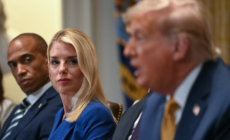-
Dodgers Predicted To Cut Ties With Former Top Prospect - 34 mins ago
-
James Comey Tracked by Secret Service After Post Critical of Trump - 47 mins ago
-
WWE Causes Massive AJ Lee Return Speculation - about 1 hour ago
-
Thune Says Russia Sanctions Vote Could Come as Soon as This Month - 2 hours ago
-
Red Sox Star Jarren Duran Offers 4-Word Response on Lost Playing Time - 2 hours ago
-
A Surgeon Shares What She Saw in Gaza’s Hospitals - 2 hours ago
-
Supreme Court Deals Blow to Republican Immigration Law in Florida - 2 hours ago
-
Jeffrey Epstein’s Brother Reacts to Trump Administration’s Review of Case - 3 hours ago
-
Body found inside a Goodwill donation bin in Pasadena - 3 hours ago
-
X CEO Linda Yaccarino Says She Is Leaving Elon Musk’s Platform - 3 hours ago
Opinion | Is Claudia Sheinbaum the Anti-Trump?
“I feel very proud about her,” Marta Lamas, an anthropology professor and leading Mexican feminist who has known Sheinbaum for years, told me in Mexico City last week. “She is a light in this terrible situation that we are facing: Putin, Trump.”
Lamas said she’d feared a sexist backlash against Sheinbaum, Mexico’s first female president, but six months into her term, there’s no sign of one. Sheinbaum was elected with almost 60 percent of the vote. Today her approval rating is above 80 percent. Last week, Bukele, who likes to call himself “the world’s coolest dictator,” asked Grok, Elon Musk’s A.I. chatbot, the name of the planet’s most popular leader, evidently expecting it would be him. Grok responded, “Sheinbaum.”
For those of us steeped in American identity politics, it can be hard to understand how a woman like Sheinbaum came to lead the world’s 11th-most-populous country. Her parents, both from Jewish families that fled Europe, were scientists who’d been active in the leftist student movement of the 1960s. As a child, Sheinbaum was a dedicated to dancing ballet, a discipline that still shows up in her graceful posture and in the many social media videos of her doing folk dances with her constituents. She did research for her Ph.D. in energy engineering at UC Berkeley and shared the 2007 Nobel Peace Prize for her work on the United Nations Intergovernmental Panel on Climate Change.
She is, in short, part of the cosmopolitan intelligentsia typically demonized by populist movements. But as I was told again and again in Mexico, her rarefied background meant little in light of her close relationship with López Obrador, who she’d worked beside since he was mayor of Mexico City 25 years ago, and whose economic populism earned him the enduring devotion of many downtrodden citizens.
As president, López Obrador more than doubled the minimum wage and pegged it to inflation to ensure that workers wouldn’t fall behind. He enacted broad social programs, including stipends for young people doing job training and, most important, universal cash transfers for the elderly. According to Mexico’s National Council for the Evaluation of Social Development Policy, five million Mexicans escaped poverty during the first four years of his presidency. (Extreme poverty, however, increased by nearly half a million.)
Source link




















